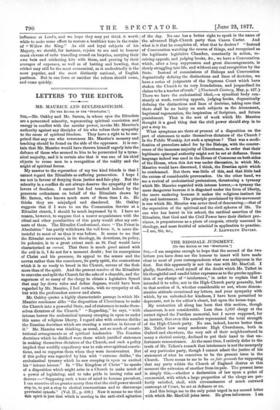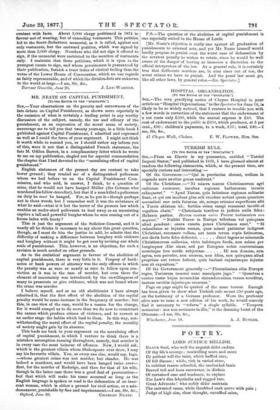THE RIDSDALE JUDGMENT.
[TO THB EDITOR 01 THE SPECTATOR.")
am sanguine enough to hope that the second of the two letters you have done me the honour to insert will have made clear to most of your correspondents what was ambiguous in the- first. But this apparently is not the case with Mr. MacColl. I gladly, therefore, avail myself of the doubt which Mr. Talbot in. his thoughtful and candid letter expresses as to the precise applica- tion of my charge of "intolerance," in order to explain that I intended it to refer, not to the High-Church party generally, but to that section of it, whether considerable or not, whose demon- strative attitude occasioned my letters, and your sympathy with. which, by an unlooked-for kindness, I have been permitted to deprecate, not in the editor's closet, but upon the house-tops.
My contention all along has been that this section, though• clamorous, is not considerable. Less than 5,000 clergy at the outset signed the Purchas memorial, but I never supposed, for- an instant, that even this number represented the total strength of the High-Church party. No one, indeed, knows better than Mr. Talbot how many moderate High Churchmen, both in Oxford and elsewhere, the very salt of their neighbourhood in many a clerical society, declined to put their hand to that un- fortunate remonstrance. At the same time, I entirely defer to the truth of Mr. Talbot's remark that intolerance is not the monopoly of any particular party, though I cannot admit the justice of his statement of what he conceives to be the present issue in the Church. There seems to me to be no fair grounds for supposing that any party within the Church of England desires at this moment the extrusion of another from its pale. The present issue is simply this,—whether a declaration of law upon a point of ceremonial, with which a large proportion of the clergy are per- fectly satisfied, shall, with circumstances of much outward contempt of Court, be set at defiance or no.
And this brings me to the only point urged in my second letter with which Mr. MacColl joins issue. He gives inferences. I am content with facts. About 3,000 clergy petitioned in 1874 in favour not of wearing, but of conceding vestments. This petition led to the Scott-Robertson memorial, as it is called, against not only vestments, but the eastward position, which was signed by more than 5,000 clergy. Numbers who did not sign it offered to sign, if the memorial were restricted to the mention of vestments only. I maintain that these petitions, which it is open to the youngest curate to sign, and whose genuineness is guaranteed by their publication, furnish a truer index of clerical feeling than the votes of the Lower House of Convocation, which no one regards as fairly representable, and of which the division-lists are unknown to the world at large.—I am, Sir, &c.,



































 Previous page
Previous page